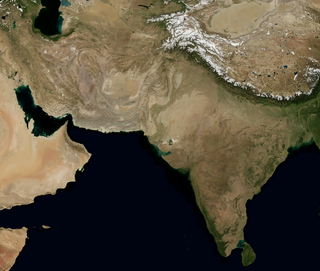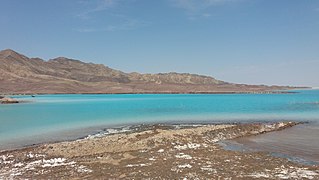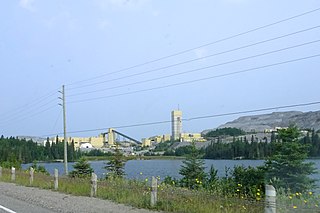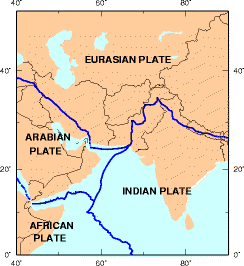
Balochistan is one of the four provinces of Pakistan. It is the largest province in terms of land area, forming the southwestern region of the country, but is the least populated. Its provincial capital and largest city is Quetta.

The Geography of Pakistan is a profound blend of landscapes varying from plains to deserts, forests, and plateaus ranging from the coastal areas of the Arabian Sea in the south to the mountains of the Karakoram, Hindukush, Himalayas, Pamir ranges in the north. Pakistan geologically overlaps both with the Indian, Arabian and the Eurasian tectonic plates where its Sindh and Punjab provinces lie on the north-western corner of the Indian plate while Balochistan and most of the Khyber Pakhtunkhwa lie within the Eurasian plate which mainly comprises the Iranian Plateau. Gilgit-Baltistan and Azad Kashmir lie along the edge of the Indian plate and are prone to violent earthquakes where the two tectonic plates collide.

The Baloch or Baluch are an Iranian people who live mainly in the Balochistan region, located at the southeasternmost edge of the Iranian plateau, encompassing the countries of Pakistan, Iran and Afghanistan. There are also Baloch diaspora communities in neighbouring regions, including in India, Turkmenistan and the Arabian Peninsula.

Chaghi District, also known as Chaghi District, is the largest district of Pakistan, located in the north west corner of Balochistan, Pakistan.

Barrick Gold Corporation is a mining company that produces gold and copper with 16 operating sites in 13 countries. It is headquartered in Toronto, Ontario, Canada. It has mining operations in Argentina, Canada, Chile, Côte d'Ivoire, Democratic Republic of the Congo, Dominican Republic, Mali, Papua New Guinea, Saudi Arabia, Tanzania, the United States and Zambia. In 2019, it produced 5.5 million ounces of gold at all-in sustaining costs of $894/ounce and 432 million pounds of copper at all-in sustaining costs of $2.52/pound. As of 31 December 2019, the company had 71 million ounces of proven and probable gold reserves.
The Chagai Hills is a range of granite hills in the Chagai District in Pakistan's Balochistan province.

Dr. Samar Mubarakmand, is a Pakistani nuclear physicist known for his research in gamma spectroscopy and experimental development of the linear accelerator.
Bekodik is an area of Chagai District located in the Balochistan province of Pakistan. In October 2006, the world's fifth largest ore reserves of gold and copper were discovered there.
Pakistan has coal deposits in Sindh, Punjab and Baluchistan provinces. The total coal resources there are reported to be approximately 185 billion tonnes.

Pakistan–Saudi Arabia relations, or Pakistani-Saudi Arabian relations, refers to the bilateral relations between Pakistan and Saudi Arabia. Relations have been historically close and friendly, frequently described by analysts as constituting a special relationship. Despite Pakistan's close relationship with Iran and Saudi Arabia's growing relationship with India, Pakistan has sometimes been dubbed as "Saudi Arabia's closest Muslim ally." Pakistan has, in line with its pan-Islamic ideology, assumed the role of a guardian of Saudi Arabia against any external or internal threat.
Pakistan's industrial sector accounts for 28.11% of the GDP. Of this, manufacturing makes up 12.52%, mining constitutes 2.18%, construction makes up 2.05%, and electricity and gas 1.36%. The majority of industry is made up of textile units, with textiles contributing $15.4b to exports, making up 56% of total exports. Other units include surgical instruments, chemicals, and a budding automotive industry.
Mining is an important industry in Pakistan. Pakistan has deposits of several minerals including coal, copper, gold, chromite, mineral salt, bauxite and several other minerals. There are also a variety of precious and semi-precious minerals that are also mined. These include peridot, aquamarine, topaz, ruby, emerald, rare-earth minerals bastnaesite and xenotime, sphene, tourmaline, and many varieties and types of quartz.

Chile–Pakistan relations refers to the bilateral, diplomatic, commercial, economic and people-to-people linkages between Pakistan and Chile. The Embassy of Pakistan in Argentina is concurrent to Chile, likewise, the Embassy of Chile in the United Arab Emirates deals with matters pertaining to Pakistan.

Pakistan and China signed a formal contract worth $350 million for development of Saindak Copper-Gold mine project. The mines were leased for a 10-year period to Metallurgical Corporation of China Ltd. (MCC), a subsidiary of the China Metallurgical Group Corporation.
The Reko Diq mine is located near Reko Diq town in Chagai District, Baluchistan, Pakistan. It is one of the largest copper and gold mines in the world located in the south west part of Pakistan in Balochistan province. Reko Diq represents one of the largest copper and gold reserves in the world having estimated reserves of 5.9 billion tonnes of ore grading 0.41% copper and gold reserves amounting to 41.5 million oz.
The economy of Balochistan, one of the four provinces of Pakistan, is largely based upon the production of natural gas, coal, and minerals. Agriculture and livestock also dominate the Baloch economy. Horticultural development is a fairly recent, yet growing phenomenon. Other important economic sectors include fisheries, mining, manufacturing industries, trade and other services being rendered by public and private sector organizations in the province.

Koh-i-Sultan is a volcano in Balochistan, Pakistan. It is part of the tectonic belt formed by the collision of India and Asia: specifically, a segment influenced by the subduction of the Arabian plate beneath the Asian plate and forming a volcanic arc which includes the Bazman and Taftan volcanoes in Iran. The volcano consists of three main cones, with heavily eroded craters running west-northwest and surrounded by a number of subsidiary volcanic centres. Its summit is 2,334 metres (7,657 ft) high, and the crater associated with the Miri cone has a smaller crater inside.
The Reko Diq case, officially known as the "Tethyan Copper Company Pty Limited v. Islamic Republic of Pakistan" case is an ongoing legal case between the Government of Pakistan and the Tethyan Copper Company (TCC) over breach of the Australia–Pakistan Bilateral Investment Treaty (BIT) and illegal denial of mining rights to TCC at the Reko Diq Mine in Chagai District, Balochistan.











